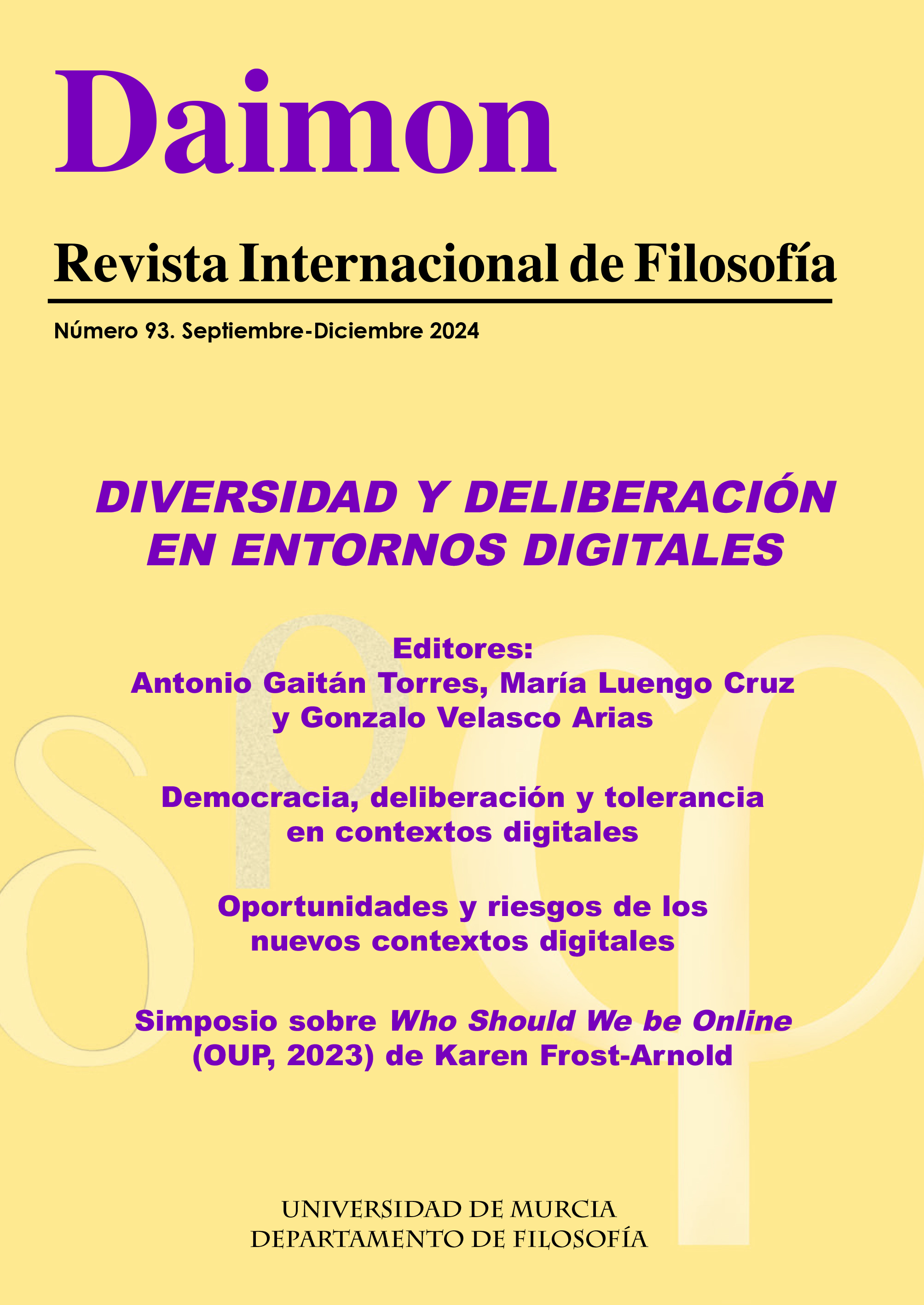On testimonial justice online. Nuancing Karen Frost-Arnold's optimistic virtue epistemology
Unterstützung
- Fundación BBVA
- Ministerio de Ciencia e Innovación
Abstract
In What Should We Be Online, Karen Frost-Arnold advocates an approach to epistemic virtues that resists pessimism about the possibility of our online epistemic agency being responsible and socially just. On the basis of a veritist epistemology, her proposal overcomes both responsibilist individualism and the socio-structural critique that delegates all responsibility to institutional transformations. The author identifies in online lurking an activity unique to online epistemic agency that can provide exposure to messages from people discriminated against by epistemic injustices. For Frost-Arnold, moreover, this implies the possibility of the lurker experiencing epistemic frictions that will favour a more reliable willingness to be fair in giving credit to the testimonies of those discriminated against. In this note I will qualify this optimistic stance, arguing the epistemic individualism that underlies it. I will point to a group virtue model as a possible solution.
Downloads
-
Abstract352
-
PDF 118
-
HTML 33
Literaturhinweise
Alfano, M. (2016). The Topology of Communities of Trust. Russian Sociological Review, 15(4), 30-56. https://doi.org/10.17323/1728-192X-2016-4-30-56
Anderson, E. (2012). Epistemic Justice as a Virtue of Social Institutions. Social Epistemology, 26(2), 163-173. https://doi.org/10.1080/02691728.2011.652211
Badhwar, N. K. (2009). The Milgram Experiments, Learned Helplessness, and Character Traits. The Journal of Ethics, 13(2-3), 257-289. https://doi.org/10.1007/s10892-009-9052-4
Baehr, J. (2011). The inquiring mind: On intellectual virtues and virtue epistemology. Oxford university press.
Baehr, J. S., & Hazlett, A. (Eds.). (2016). The Civic Virtues of Skepticism, Intellectual Humility, and Intellectual Criticism. En Intellectual virtues and education: Essays in applied virtue epistemology (pp. 71-92). Routledge, Taylor & Francis Group.
Berenstain, N. (2016). Epistemic Exploitation. Ergo, an Open Access Journal of Philosophy, 3(20201214). https://doi.org/10.3998/ergo.12405314.0003.022
Brinkmann, M. (2022). In Defence of Non-Ideal Political Deference. Episteme, 19(2), 264-285. https://doi.org/10.1017/epi.2020.26
De Ridder, J. (2022). Online Illusions of Understanding. Social Epistemology, 1-16. https://doi.org/10.1080/02691728.2022.2151331
Driver, J. (2001). Uneasy Virtue (1.a ed.). Cambridge University Press. https://doi.org/10.1017/CBO9780511498770
Dutilh Novaes, C. (2023). The (higher-order) evidential significance of attention and trust—Comments on Levy’s Bad Beliefs. Philosophical Psychology, 36(4), 792-807. https://doi.org/10.1080/09515089.2023.2174845
Fisher, M., Goddu, M. K., & Keil, F. C. (2015). Searching for explanations: How the Internet inflates estimates of internal knowledge. Journal of Experimental Psychology: General, 144(3), 674-687. https://doi.org/10.1037/xge0000070
Fricker, E. (1995). Telling and Trusting: Reductuonism and Anti-Reductionism in the Epistemology of Testimony. Mind, 104(414), 393-411.
Fricker, M. (2010). Replies to Alcoff, Goldberg, and Hookway on Epistemic Injustice. Episteme, 7(2), 164-178. https://doi.org/10.3366/epi.2010.0006
Frost-Arnold, K. (2023). Who should we be online? A social epistemology for the Internet. Oxford University Press.
Goldman, A. I. (2010). Systems-oriented social epistemology. En Tamar Szabó Gendler & John Hawthorne (eds.). Oxford Studies in Epistemology, Vol. 3. (pp. 189-214.). Oxford University Press.
Heersmink, R. (2018). A virtue epistemology of the Internet: Search engines, intellectual virtues and education. Social Epistemology, 32(1), 1-12.
Lackey, J. (2007). Why we don’t deserve credit for everything we know. Synthese, 158(3), 345-361. https://doi.org/10.1007/s11229-006-9044-x
Levy, N. (2019). Due deference to denialism: Explaining ordinary people’s rejection of established scientific findings. Synthese, 196(1), 313-327. https://doi.org/10.1007/s11229-017-1477-x
Levy, N. (2022). Bad beliefs: Why they happen to good people (First edition). Oxford University Press.
Levy, N. (2023). Too humble for words. Philosophical Studies, 180(10-11), 3141-3160. https://doi.org/10.1007/s11098-023-02031-4
Marin, L., & Copeland, S. M. (2022). Self-Trust and Critical Thinking Online: A Relational Account. Social Epistemology, 1-13. https://doi.org/10.1080/02691728.2022.2151330
Sosa, E. (1995). Knowledge in perspective selected essays in epistemology. Cambridge University Press.
Sullivan, Emily. (2019). Beyond Testimony: When Online Information Sharing is not Testifying. Social Epistemology Review and Reply Collective, 8(10), 20-24.
Sullivan, S. (2006). Revealing whiteness: The unconscious habits of racial privilege. Indiana University Press.
Vallor, S. (2016). Technology and the virtues: A philosophical guide to a future worth wanting. Oxford University press.
Véliz, C. (2019). Online Masquerade: Redesigning the Internet for Free Speech Through the Use of Pseudonyms. Journal of Applied Philosophy, 36(4), 643-658. https://doi.org/10.1111/japp.12342
Copyright (c) 2024 Daimon

Dieses Werk steht unter einer Creative Commons Namensnennung - Nicht-kommerziell - Keine Bearbeitung 3.0 International -Lizenz.
Las obras que se publican en esta revista están sujetas a los siguientes términos:
1. El Servicio de Publicaciones de la Universidad de Murcia (la editorial) conserva los derechos patrimoniales (copyright) de las obras publicadas, y favorece y permite la reutilización de las mismas bajo la licencia de uso indicada en el punto 2.
2. Las obras se publican en la edición electrónica de la revista bajo una licencia Creative Commons Reconocimiento-NoComercial-SinObraDerivada 3.0 España (texto legal). Se pueden copiar, usar, difundir, transmitir y exponer públicamente, siempre que: i) se cite la autoría y la fuente original de su publicación (revista, editorial y URL de la obra); ii) no se usen para fines comerciales; iii) si remezcla, transforma o crea a partir del material, no podrá distribuir el material modificado.
3. Condiciones de auto-archivo. Se permite y se anima a los autores a difundir electrónicamente las versiones pre-print (versión antes de ser evaluada) y/o post-print (versión evaluada y aceptada para su publicación) de sus obras antes de su publicación, ya que favorece su circulación y difusión más temprana y con ello un posible aumento en su citación y alcance entre la comunidad académica. Color RoMEO: verde.











